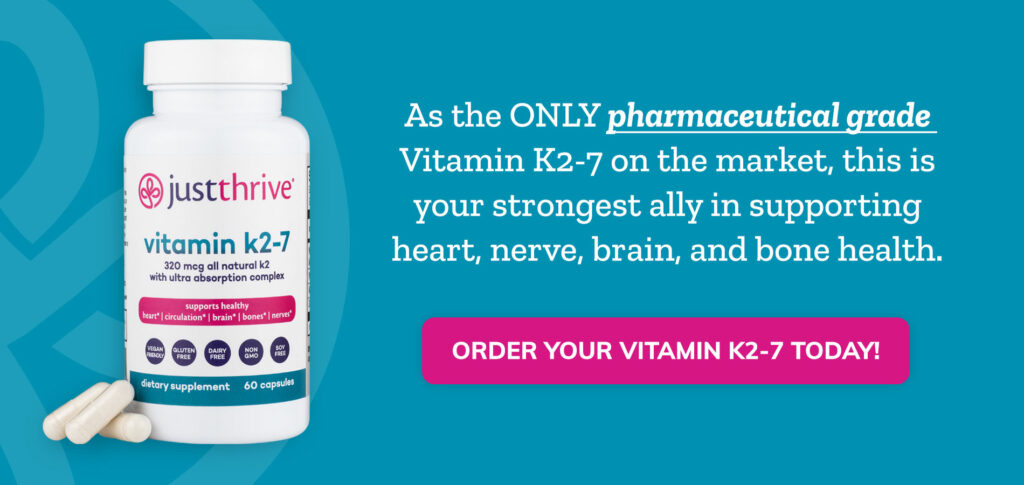Table of Contents[Hide][Show]
- What Is Vitamin K2?
- What is Vitamin K2 MK7?
Vitamin K2 Benefits+−
- Directs Calcium to the Right Places
- Prevents Heart Disease
- Promotes Bone Health
- Regulates Vitamin D
- Here Comes The Sun: Fighting Vitamin D Deficiency!
- Lowers Blood Glucose
- Probiotics for Diabetics: How Your Gut Microbiome Helps Maintain Healthy Blood Sugar
- Assists in Blood Clotting
- Boosts Cardiac Output
- May Improve Dental Health
- May Help Fight Cancer
Most people have a working knowledge of the “alphabet” vitamins. They know that the B’s give them energy. They’ll reach for vitamin D to develop strong, healthy bones and teeth. And they stock up on vitamin C, the immune booster, during cold and flu season. But ask about vitamin K and suddenly… crickets.
For all but the most nutrition-minded consumers, vitamin K and its varieties, K1 and K2, are a puzzle. Yet this power-packed nutrient is full of benefits that encourage your overall health: building strong bones, assisting in blood clotting, promoting a healthy heart, and more.
Let’s take a closer look at vitamin K2 (and its sub-type vitamin K2 MK7), its many positive effects, and how you can incorporate it into your daily diet.
What Is Vitamin K2?
Vitamin K was first reported in a German scientific journal in 1929. It was deemed to be a coagulator or “Koagulationsvitamin”—hence the “K” in vitamin K.
Vitamin K comes in two different forms: vitamin k1 and vitamin K2. Both of these are fat-soluble vitamins, meaning that their absorption into the bloodstream is enhanced when they are consumed along with healthy, dietary fats.
The Differences Between Vitamin K1 and Vitamin K2
Although they both belong to the vitamin K family, these two nutrients differ in several ways, including their benefits.
Food Sources
One way to distinguish vitamin K1 and vitamin K2 is through their origins. Vitamin K1 is much easier to obtain from dietary sources:
- Vitamin K1 is a phylloquinone, meaning it’s found mostly in green leafy vegetables.
- Vitamin K2 is a menaquinone, which means it occurs in some animal products (especially organ meats) and fermented foods. It is also produced, in a smaller amount, by gut bacteria.
Benefits
The two forms of vitamin K also play different biological roles in your body.
- Vitamin K1 has an important role in helping with blood coagulation. . It supports blood clotting and prevents excessive bleeding, bruising, or, in extreme cases, hemorrhaging.
- Vitamin K2 has a much wider range of benefits, including regulating/managing calcium, boosting your heart health, lowering blood sugar levels, and more. It also assists in blood clotting but to a lesser degree than vitamin K1.
What is Vitamin K2 MK7?
Vitamin K1 only comes in its one form. But vitamin K2 is further broken down, depending on the length of its compound chains, into MK4 through MK13.
Vitamin K2-MK7 (also known as vitamin K2-7, the MK7 comes from menaquinone 7) is widely regarded as being the most efficient and effective form of vitamin K2. A recent study revealed that of all the K2 vitamins, vitamin K2-MK7 is the version with the highest bioavailability (it is more easily absorbed and stays active for a longer time).
Vitamin K2 Benefits
We’ve very briefly touched on the main health benefits provided by the super-nutrient K2. Let’s look a little more deeply at these as well as examining some of the others.
Directs Calcium to the Right Places
Calcium is one of the most important nutrients. When your body uses it correctly, the result is strong, healthy bones and teeth. Unfortunately, your body needs significant help in ensuring it’s using calcium correctly.
Calcium should go to your bones. But if left undirected, it can end up in your soft tissue, instead. This causes vascular calcification (a hardening of the tissues) that can lead to bone spurs, liver and kidney stones, stiff blood vessels, cardiovascular disease, and major cardiac events.
That’s where vitamin K2 comes in. It acts as an air traffic controller, directing calcium exactly where it needs to go. In your body, it prevents calcium deposits from forming in your blood vessels, kidneys, liver, or other soft tissue. It even works to remove calcium from your arteries. In turn, it directs calcium to the places of your body where it can do the most good.
Prevents Heart Disease
When vitamin K2 directs calcium properly, hard deposits are prevented from forming inside soft tissues such as artery walls. This, in turn, keeps your blood vessels more flexible, ensuring a smoother, easier blood flow and boosting circulation.
By preventing arterial disease and blood vessel calcification, vitamin K2 takes stress off the heart. Simply put, without having to try to push blood through clogged arteries (medical term: arteriosclerosis), your heart doesn’t have to pump as hard. This makes your heart’s job easier and keeps your heart healthy!
Researchers have found strong correlations between vitamin K2 intake and cardiovascular health.
- In one study on dietary intake of menaquinone, participants with high vitamin K2 intake had a 57% lower risk of dying from heart disease.
- Another study showed that for every 10 micrograms of K2 consumed per day, the risk of heart disease was lowered by 10%.
Promotes Bone Health
In its role of calcium traffic controller, vitamin K2 regulates your body’s ability to properly deposit calcium where it’s needed.
There are two proteins in your body that help bind calcium to your bones through the processes of bone mineralization and calcium homeostasis: matrix GLA protein (MGP) and osteocalcin. Our favorite osteo-powerhouse, vitamin K2, activates these proteins, helping build bone strength, increasing bone mineral density, decreasing bone fracture rates, and fighting off bone disease (such as osteoporosis).
Japanese researchers have found vitamin K2 to be especially beneficial for postmenopausal women, who are more likely to suffer from decreased bone density. Clinical trial participants with increased K2 intake significantly decreased their risk of fractures. As a result, vitamin K2 is regularly prescribed in Japan to prevent and treat osteoporosis.
Regulates Vitamin D
Just because you eat foods with a high calcium content doesn’t necessarily mean that you’ll benefit from it… without vitamin D.
One of the main functions of vitamin D (the “sunshine vitamin”) is to enhance your body’s ability to absorb calcium. It ensures that your body is drawing the maximum amount of calcium from the foods you eat.
But, vitamin D doesn’t direct where that calcium is deposited. This can create a toxic situation in your body, with high levels of calcium going to the wrong places (soft tissues instead of your bones).
Vitamin K2 plays an essential role as cofactor for creating optimal balance: vitamin D to raise the calcium levels and vitamin K2 to direct it.
Many people who don’t live in an area that gets a lot of sunlight take Vitamin D3 supplements that can act as a passable substitute. (You can get both vitamin K2-7 and D3 together in one convenient supplement from Just Thrive.)
Related
Here Comes The Sun: Fighting Vitamin D Deficiency!
Discover how you can ensure you are getting enough vitamin D, plus learn about the other vitamin that works together with D3 for optimal health benefits.
Lowers Blood Glucose
K2 has also been proven to normalize blood glucose levels. This is due to the protein osteocalcin, activated by K2, which acts like a hormone and reduces both insulin sensitivity and blood glucose.
A high blood glucose level is also associated with an elevated risk of diabetes and mood disorders. Studies show that when K2 lowers blood sugars, it also works to reduce the possibility of type 2 diabetes and minimize depression and anxiety.
Related
Probiotics for Diabetics: How Your Gut Microbiome Helps Maintain Healthy Blood Sugar
Probiotics for diabetics can make a big impact in managing and even preventing this disease. Learn how probiotics help maintain healthy glucose levels and blood pressure, improve insulin sensitivity, promote heart health, and more.
Assists in Blood Clotting
Your body uses the entire vitamin K family to produce a protein called prothrombin, which is crucial to blood clotting. This reduces both excessive bleeding and severe bruising, and promotes wound healing. It also prevents potentially dangerous—even fatal—hemorrhages.
Some blood thinning medications (anticoagulants such as Warfarin) are known to antagonize vitamin K. Patients who take these medicines are monitored to make sure their vitamin K levels remain consistently high.
Boosts Cardiac Output
Vitamin K2-MK7 also fuels mitochondria—the “batteries” that supply energy to all of the cells in your body, including muscles. One muscle in particular has a lot of mitochondria: your heart.
In a study of athletes who took vitamin K2 for eight weeks, their cardiac output (the amount of fresh oxygenated blood pumped by the heart) increased by 12%.
Strengthening the heart muscle is a huge workout benefit not just to elite athletes, but for everyone. We all need healthy hearts!
May Improve Dental Health
At this time, there haven’t been enough studies to establish a definitive correlation on the effects of K2 on dental health. But scientists have made some reasonable conclusions.
Osteocalcin, the protein activated by K2, is believed to stimulate the growth of dentin, the calcified tissue underneath your tooth enamel.
By prompting the activation of osteocalcin, and therefore dentin, K2 likely promotes healthy teeth, too.
May Help Fight Cancer
Researchers are constantly investigating new ways to prevent, treat, and cure cancer. Recently, several promising studies have shown a possible link between K2 and the successful recovery from two specific types of cancer: liver and prostate cancer.
- Liver Cancer: Two separate clinical studies found that a high vitamin K2 intake seemed to reduce the recurrence of liver cancer and increased the participants’ survival times.
- Prostate Cancer: Another study found that participants who increased their K2 levels had a 63% lower risk of advanced prostate cancer.
It’s important to note that these are preliminary studies. Much deeper studies and evaluations need to be conducted before K2 can be considered a treatment option for cancer.
Sources of Vitamin K2
Vitamin K2 can be taken naturally or as a dietary supplement, with a recommended daily intake of 320 mcg. Although that’s a fairly low amount, there’s no danger of having an excess of vitamin K2, because your body will quickly break down and excrete any amounts that it doesn’t need.
Food Sources
These are the most potent dietary sources of K2 (based on 100-gram servings unless otherwise indicated).
- Natto (fermented soybeans): 108 micrograms
- Eel: 63 micrograms
- Cheeses
- Munster: 100 micrograms
- Camembert: 68 micrograms
- Edam and aged Gouda: 63 micrograms’
- Cheddar: 24 micrograms
- Organ meat, such as beef liver: 11 micrograms
- Chicken: 10 micrograms
- Butter: 2.1 micrograms per tablespoon
- Sauerkraut: 2.75 micrograms per half-cup
- Egg yolks: between 67 and 192 micrograms per yolk (depending on the hen’s diet)
Generally speaking, the foods on this list derived from animal products will contain MK4, while the fermented foods will contain MK5–MK14.
K2 Supplements
The list of foods that contain enough K2 isn’t very long, and some of these foods are an acquired taste not common to the standard Western diet. The most commonly eaten food, cheese, is high in fat and not recommended in high enough amounts to function as your only source of vitamin K2. And, if you need or prefer a diet without animal products, soybeans would be your only option.
Because of these limitations, vitamin K2 is often recommended through supplementation.
Additionally, when there’s a deficiency (discussed below), supplements are an easy and effective way to boost vitamin K2 levels back to where they need to be to promote your overall health. However, there are a few disclaimers about taking supplements:
- If you decide to take a supplement, only buy from reputable companies that put all of the necessary nutritional information on their labels.
- Concentration levels can vary, so choose your supplements carefully and be sure that you are getting the right dosage (320 mcg is optimal).
- Look for Pharmaceutical Grade products; these are guaranteed to be at minimum 99% pure.
- Another big issue to be aware of with vitamin K2 supplements is their stability. Supplements can deteriorate quickly on the shelf. Look for products formulated with MenaquinGoldTM, which ensures maximum stability.
Many dietary supplements, including vitamin k2, have not been evaluated by the United States Food and Drug Administration (FDA) and are not intended to treat, cure, or prevent any disease. They may help to lower risk factors of certain conditions, but they shouldn’t be used as a substitute for professional medical treatment or prescribed medication.
The Gut Microbiome
Your gut microbiome is home to a thriving community of bacteria, both good (probiotics) and bad (pathogens). Both bacterial types can form thriving communities in your gut, with a precarious struggle between the two. In an ideal world, your “beneficial” bacteria would outnumber the bad bacteria in quantity and quality, leading to a healthy, balanced gut.
A strong gut plays a key role in boosting your overall health and wellbeing. One of the ways it does so is by producing vitamin K2.
Beneficial bacteria is responsible for the production of K2 in the colon. This can play a significant role in the presence of vitamin K2 in your body, especially during short lapses in dietary consumption (through supplements or food). However, it’s not generally produced in high enough quantities to be your body’s only source of vitamin K2.
Signs of a Vitamin K2 Deficiency
According to estimates, 97% of adults are deficient in Vitamin K2. Here are some general symptoms to be aware of:
- Delayed blood clotting
- Prolonged prothrombin time (the time it takes for a blood sample to form clots, as measured by a physician)
- Excessive bleeding or bruising
- Hemorrhaging
- Osteopenia (the precursor to osteoporosis)
- Osteoporosis
Unfortunately, many of these symptoms aren’t obvious until they are in a more advanced stage, which is why it’s crucial to make sure you are getting enough vitamin K2 daily.
Infants and Vitamin K Deficiency
Infants are particularly susceptible to a vitamin K deficiency, because this essential nutrient can’t cross the placenta and only negligible amounts are found in breast milk. This can create a serious and sometimes fatal situation.
In newborns and infants, even minor bleeding will be dangerous because the lack of K causes problems with blood clotting. Newborns who do not receive a vitamin K shot at birth are 81x more likely to experience severe bleeding than those who do.
To safeguard them from a severe situation, they’re typically given a vitamin K1 shot before they leave the hospital. This shot protects them until they are roughly 6 months of age, at which point they’ll have enough vitamin K in their system.
Final Thoughts
If your vitamin alphabet has been ending at vitamin E, it’s time to expand your nutrients! Bone health, heart health, and more are all benefits of vitamin K2, the “superhero” version of vitamin K.
Vitamin K2 is a powerhouse nutrient that offers a wide range of health-enhancing benefits. If dietary changes alone aren’t enough for you to reach the optimum intake, consider supplements to reach the recommended daily dosage and boost your overall healthcare.
You May Also Like…






